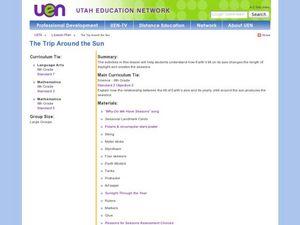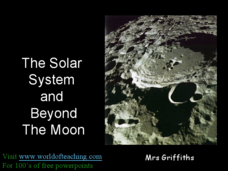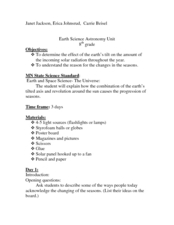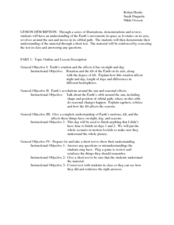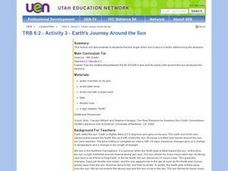Purdue University
Sun Tracking System for a Solar Panel
Capture the Sun's rays as best as possible. An engaging STEM lesson teaches scholars about how Earth's tilt causes the path of the sun to change throughout the year. They create solar panel systems that move both horizontally and...
Curated OER
The Earth in Space
Students use computer images to explain why the Earth has seasons and examine the phases of the moon. They create 3-D images and present them to the class. They answer a series of questions at the end of the lesson.
NASA
The Science of the Sun
There's more to that glowing ball of light in sky than most children realize. From the overall structure of the solar system, to the changing of the seasons, these hands-on lessons open the eyes of young scientists to...
Curated OER
Tides, Eclipses, Day and Night, and Seasons
In this earth science worksheet, students use the clues given at the bottom of the sheet to complete the crossword puzzle on tides, eclipses, day and night, and the seasons of the year. There are 17 clues to solve in the puzzle.
Curated OER
Sundials and Shadows - What Can They Teach Us About Seasons?
Students collect and analyze data relating to seasonal changes. They view a video, research web sites and build a sundial to collect their data.
Curated OER
Tilted Earth
What causes Earth's seasons? Find out through a series of anticipatory questions, an easy yet powerful activity representing the sun-Earth system, a diagram to label, and follow-up questions. Dispel the misconceptions about Earth being...
Curated OER
The Trip Around the Sun
Sixth graders investigate the relationship between the tilt of the Earth's axis and the seasons. In this earth science activity, 6th graders sing the song "Why Do We Have Seasons" and use simulate the Earth's tilt by using their bodies.
Curated OER
The Solar System and Beyond: The Moon
Here is a very basic look at the moon and its positioning around our planet. The pictures and labels here show different phases and will help your space explorers understand our changing views of the moon along with the Earth's tilt and...
Curated OER
Earth Science Astronomy Unit: Seasons on Earth
Eighth graders describe how the Earth's position causes seasonal changes. In this astronomy lesson, 8th graders explain how solar radiation varies depending on the season. They create a collage or poster on each of the Earth's four seasons.
Curated OER
Earth's Movement in Space
Students explain how the Earth's tilt and rotation causes night and day. In this earth science lesson, students determine how seasonal changes are caused by Earth's revolution. They play a jeopardy team game at the end of the unit to...
Curated OER
Seasons on Earth
Students engage in a multimedia study of the seasons in relation to the sun's angle of incidence on the Earth as it is tilted on its axis. They interpret satellite maps of the world as they show seasonal changes in plant life.
Curated OER
Reasons for the Seasons
Students discover how the Earth's axis of rotation affects the angle of sunlight and the length of day. They take a survey and give the survey out to family members and friends. They tally their findings and then determine the correct...
Curated OER
Heating the Earth
Middle schoolers explore how the angle of sunlight affects the Earth's temperature and seasons and then apply this understanding to their local situation.
Space Awareness
Climate Zones
The climate at the equator is hotter than the climate at the poles, but why? The lesson plan goes in depth, explaining how the angles of illumination relate to the heating rate at different latitudes and seasons. Scholars use a strong...
Curated OER
Observation and Inference
Assess your young scientists' understanding of the difference between observation and inference with this 20-question multiple choice quiz. It reviews a variety of physics and astronomy concepts, such as solar eclipses and sunspots, the...
Curated OER
Orbits Worksheet #1
A diagram of Earth's path around the sun, including the position of the moon, is displayed at the top of the worksheet. Five multiple questions get astronomers to analyze the diagram considering what is going on in the solar system. Use...
Curated OER
Hello, Sunshine!
Students investigate how the sun travels across the sky at different latitudes using Solar Motion Demonstrator. In this earth science lesson, students explain why seasons change. They study how the tilt of the Earth's axis affects...
Curated OER
Season's Greetings
Students explore Earth's seasons using an interactive website. In this earth science lesson, students watch video segments and explain Earth's seasonal milestones. They discuss the factors that causes seasonal changes.
Curated OER
Surface Air Temperature Trends of the Caribbean
Students use real satellite data to determine the changes in near-surface air temperature at different times of the year over the Caribbean Sea. They discover how Earth's tilt causes seasonal differences in incoming solar energy. They...
Curated OER
Seasons
Students investigate the reason for seasons on Earth during three activities. They construct a model of the Earth and Sun to identify patterns in the changes of the angle of light on the Earth's surface. Then they conduct a heat...
Curated OER
Earth's Journey Around the Sun
Sixth graders examine how the angle of the sun's rays is a factor in determining the seasons. They watch a teacher demonstration of the concepts and write a paragraph demonstrating their understanding.
T. Smith Publishing
Earth
Young astronomers read an informational text passage and then answer questions based on what they read.
Curated OER
Seasons and Shadows: Investigate How Shadows Shift Throughout the Year
Young scholars examine their shadows and why they are different in the summer and winter. In this seasons lesson plan students complete an activity to see how the earth's tilt on its axis changes the length of shadows.
Curated OER
The Earth is Tilted, What Does that Mean?
Students examine the tilt in the Earth's revolution around the sun. Using that information, they draw a picture and label the indirect and direct rays of the sun. In groups, they answer discussion questions and complete an assessment...








